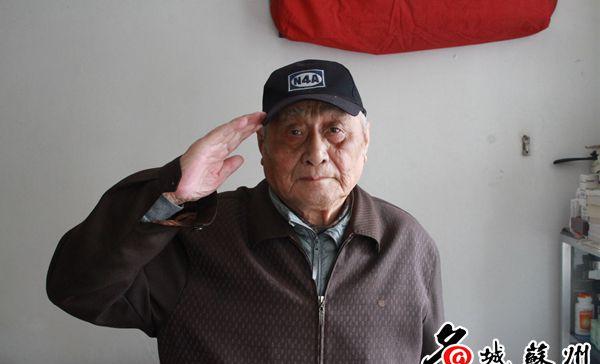
Mingcheng Suzhou Network News (reporter Xiong Shuguang) "I am the interrogator of the Chinese People's Volunteer Army, we give preferential treatment to prisoners, don't be afraid, you must tell the truth!" On the eve of the 70th anniversary of the Chinese People's Volunteer Army's war to resist the United States and aid Korea, Zhu Ke, a veteran of the war who lived in the community of Sanyuan and One Village in Gusu District, recalled his experience as an interrogator and still remembers it vividly.
Despite being an elderly man, Zhu Ke, who was sitting on a wicker chair, still looked tall and not angry. During the War to Resist US Aggression and Aid Korea, he went to Korea three times to participate in the war, the first two times as an anti-aircraft artillery commander to guard the air defense line, the third time was to interrogate American prisoners of war, and obtained a large amount of intelligence from the enemy.
Tall and burly, with majestic eyes, Zhu Ke, who was one meter eight, was the perfect candidate for the inquisitor. In 1953, he entered Korea for the third time, and formed an interrogation team with two English translators to interrogate captured American pilots.
During the War to Resist US Aggression and Aid Korea, commanders constantly stressed the need to do their utmost to capture US pilots alive, and absolutely not to shoot US pilots who parachuted or landed on the ground after parachuting.
It is very likely that the surviving American pilots will re-join the military operation against the volunteers after the change of prisoners, causing great casualties to the volunteer soldiers. Why do volunteer commanders still emphasize capturing American pilots alive? For example, the reason why Qian Xuesen was able to return to China was that the volunteer army exchanged eleven American pilot prisoners, and the value of the AMERICAN prisoners to us was too high. In addition, the volunteers could obtain their intelligence from the captives.
"I interrogated more than 20 pilots that year, including fighters of different types and people with different positions, mainly involving the situation of the enemy air force, such as the location of the air force military base, facilities, responsible persons, aircraft types, etc., as well as the tactics they used in attacking our side, flight altitude, angle, etc." Zhu Ke recalled that it was with this precious information that the volunteers avoided greater losses in the subsequent battles.
Many pilots were aware of the volunteer army's preferential treatment policy and were very cooperative with interrogations and had to answer questions. But there are also some uncooperative, clever. Faced with this situation, the interpreter and the interrogator, Juke, looked at each other, and he understood. I can't beat them or scold them, what should I do? Zhu Ke sat on a stool with a straight waist, a gun in one hand and a fist in the other, and his eyes were fierce, as if he could swallow a cow.
When the American prisoners saw this battle, they bowed their heads in fright and could only honestly explain to the interpreter.
"Lay down your arms and you're a friend!" In fact, Zhu Ke said, everyone cherishes peace and hates war. During the interrogation, there were also American soldiers who took out family photos from their pockets and expressed their eagerness to return to China, or visit their parents, or marry their girlfriends...
Today, 93-year-old Zhu Ke enjoys his old age in his home in Sanyuanyi Village, Gusu District, and he still remembers those magnificent years vividly. "The friend comes with good wine, and if the jackal comes, there is a shotgun waiting for him!" Although his ears were deafened by the anti-aircraft guns, when he sang "Singing the Motherland", Zhu Ke's singing voice was still high-pitched and powerful.
Editor-in-Charge: Xiong Shuguang